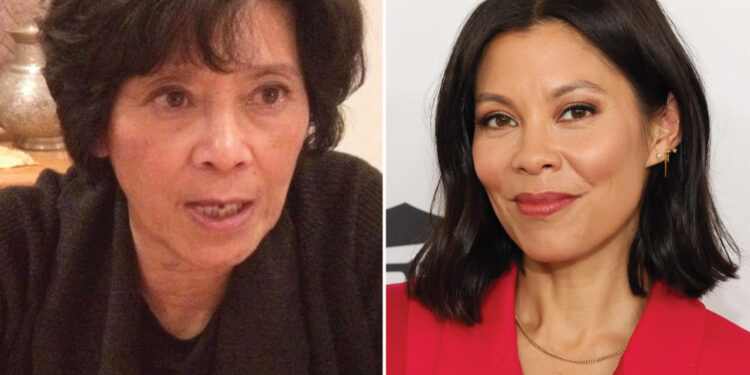Not everyone knows the name Tin Swe Thant, but her story is one worth telling. She may not be a public figure, but she played a big part in raising one. Her daughter, Alex Wagner, is a well-known journalist and TV host. You may have seen her on MSNBC or read her writing. But behind her voice is a strong and quiet woman — her mom.
Tin Swe Thant was born in Burma (now called Myanmar). She moved to the U.S. many years ago and lived a life full of change, love, and strength. From being forced to change her name as a child to raising a biracial daughter in America, her story has many layers. In this article, we’ll explore her life step by step — her childhood, her move to the U.S., her family life, and how she influenced her daughter’s identity.
Tin Swe Thant Quick Bio
| Full Name | Tin Swe Thant |
| Known As | Alex Wagner’s mother |
| Birthplace | Yangon (Rangoon), Burma (now Myanmar) |
| Nationality | Burmese-American |
| Childhood Name | Maureen Thant Gyi (school name) |
| Education | Swarthmore College, Political Science |
| Immigrated To | United States (1960s) |
| Spouse | Carl Wagner (divorced, died in 2017) |
| Daughter | Alex Wagner (journalist, TV host) |
| Grandchildren | Cy Mindon Wagner, Rafael Thiha Wagner |
| Lives In | Long Island, New York |
| Social Media | Instagram (last post in December 2022) |
Where Was Tin Swe Thant Born and Raised?
Tin Swe Thant was born in Yangon, which was called Rangoon at the time. It’s the biggest city in Burma — now known as Myanmar. She grew up during the last years of British rule, when Burma was still a colony.
Life wasn’t simple during those times. People in Burma were expected to follow British rules, even in schools. That meant many children had to let go of their traditions just to get an education. Tin was one of those children. Her early years were filled with moments where her culture was challenged, but she never let go of who she truly was.
Even as a young girl, she was strong. She listened, she learned, but deep inside, she held on to her identity — something that would matter a lot later in her life and in her daughter’s life too.
Why Did She Have to Change Her Name?
When Tin Swe Thant started school, she was told she needed an English name. That was the rule. Her real Burmese name — “Tin Swe” — wasn’t accepted. Can you imagine being a child and hearing that your name, the one given to you by your family, wasn’t allowed?
Her father, U Thant Gyi, was caught off guard when the school headmaster asked for her English name. So, on the spot, he chose a name he knew — Maureen, after the actress Maureen O’Hara. From then on, at school, she was called Maureen Thant Gyi.
But this name change wasn’t something Tin chose. It was forced. And even though she used it in school, she didn’t feel like Maureen. She still felt like Tin Swe. That small moment — being renamed just to fit in — stayed with her for life.
Moving to America
In the 1960s, Tin Swe Thant made a bold move. She left Burma and traveled all the way to the United States to study. She was young, far from home, and entering a country with a completely different culture. But she was ready to begin a new chapter.
This time, she didn’t use the name “Maureen.” She used her real name — Tin Swe Thant — with pride. No one told her to change it. In America, she finally got the chance to be herself again.
It wasn’t easy being an immigrant. There were new foods, new rules, and new people. But Tin was brave. She kept learning, made new friends, and stayed true to who she was. That quiet strength helped her build a life she could be proud of.
What Did Tin Swe Thant Study in College?
Tin Swe Thant went to Swarthmore College in Pennsylvania. It’s one of the top schools in the U.S. There, she studied political science, a subject that looks at how governments work and how people are affected by power and laws.
It’s easy to see why she chose that field. After all, she had lived through a system that made her give up her name and parts of her identity. Maybe she wanted to better understand the world and the systems that shape people’s lives.
Her college years were more than just studying. It was a time when she grew as a person, learned about American life, and found her voice. That experience shaped how she saw the world — and later, how she raised her daughter.
Who Was Tin Swe Thant’s Husband?
While living in America, Tin Swe Thant met a man named Carl Wagner. He came from Iowa and had a very different background. He was white, with roots in Ireland, Germany, and Luxembourg. But despite their differences, they connected.
Carl Wagner became a well-known figure in U.S. politics. He helped run Bill Clinton’s 1992 campaign, which helped Clinton become President. But before all of that, he was just a man who fell in love with Tin Swe Thant.
They got married and moved to Washington, D.C., where they built a life together. They had one child — a daughter named Alex Wagner. Even though Tin and Carl later got divorced, they shared the bond of raising their child with love and respect for both cultures.
Raising Alex Wagner with Love and Discipline
As a mom, Tin Swe Thant was firm but loving. She believed in teaching values like respect, education, and hard work. She once told her daughter, “I’m not your friend. I’m your mother.” It was her way of saying that parenting came before friendship — and it worked.
At home, Tin made sure Burmese culture was alive. She told stories, shared traditions, and cooked food from her homeland. Her husband, Carl, shared his own traditions too. Their home was a place where two very different cultures came together beautifully.
But not everyone outside their home understood. One time, while eating at a diner with her dad, a cook asked Alex if she was adopted. She felt embarrassed and answered, “My mom’s Asian.” That small moment left a mark on her. It made her think about how others saw her — and how she saw herself.
A Powerful Moment That Shaped Alex’s Identity
As Alex Wagner grew up, she started to think more about who she was. One memory stood out to her — the moment at the diner when someone asked if she was adopted. She felt confused, even a little ashamed. Her answer — “My mom’s Asian” — felt awkward at the time.
Later in life, as she learned more about race, history, and identity in America, that moment became even more meaningful. She began to understand how deep her mother’s experience went. Being forced to change her name as a child wasn’t just a school rule — it was a message that her true self didn’t belong.
Alex has talked about how sad and angry she felt when she realized this. She said, “Her Asian identity was willfully erased, and we let them do it to us.” That realization helped Alex find her voice — not just as a journalist, but as a woman proud of her mixed heritage. And it all started with her mother, Tin Swe Thant.
How Tin Swe Thant Inspired Her Daughter’s Voice
The story of Tin Swe Thant didn’t just stay in the past — it became a lesson for the future. Alex Wagner often says her mother’s life helped her understand herself better. The quiet strength Tin showed, the choices she made, and the way she stood by her identity, all had a big impact.
Alex now speaks openly about issues like race, culture, and being biracial. She’s proud of her Burmese roots and talks about them on TV, in interviews, and in her writing. Her mom’s story gave her the power to speak up for others who feel different or unseen.
This is what makes Alex Wagner’s mother, Tin Swe Thant, so special. She didn’t shout. She didn’t try to be famous. But her story — her truth — helped shape one of the most trusted voices in American journalism today.
Grandmother Life: Passing Down Burmese Culture
Tin Swe Thant is now a grandmother — and she’s just as thoughtful as ever. When Alex was pregnant with her second son, Tin made a phone call. She told Alex, “I have a name.” The name was Thiha, which means “lion” in Burmese.
Alex and her husband, Sam Kass, loved it. Their son became Rafael Thiha Wagner. Their first child, Cy, also has a Burmese middle name — Mindon. These names are more than just words. They are a link to a rich culture, passed from grandmother to grandchildren.
Tin didn’t just raise a proud daughter — she’s now helping build a proud family. Even though her grandsons are growing up in the U.S., they carry a piece of Burma with them every day, all thanks to her.
Where Is Tin Swe Thant Today?
Today, Tin Swe Thant lives a quiet life on Long Island, New York. She is retired now and enjoys a calm, peaceful routine. She spends time with her family, especially her grandkids, and enjoys small, meaningful moments.
She has an Instagram account, but she doesn’t post often. Her last post was in December 2022. Still, she pops up on Alex Wagner’s Instagram now and then — in sweet birthday photos, Mother’s Day posts, and family outings.
She may not be in the news. She may not be on TV. But in her own quiet way, she continues to shine.
What Makes Tin Swe Thant’s Story So Special?
What makes Tin Swe Thant’s life inspiring isn’t fame or wealth — it’s her strength, love, and quiet courage. She stayed true to herself even when people tried to erase her name and culture. She moved across the world and built a new life, without ever forgetting who she was.
As Alex Wagner’s mother, she raised a daughter who became a strong, smart, and thoughtful voice in America. And she passed on her values not just to her daughter, but also to her grandkids.
There are many women like Tin Swe Thant — women who stay out of the spotlight, but still shape the world in powerful ways. Her story reminds us to look a little closer and listen a little deeper.
Final Thoughts
In 2025, stories like Tin Swe Thant’s matter more than ever. Her life teaches us about identity, love, and staying strong when things get tough. From Yangon to Long Island, her journey is filled with lessons that still speak to us today.
She didn’t fight battles with a microphone or a stage. She did it with choices — quiet, steady, and full of meaning. She gave her daughter the gift of pride, culture, and courage. And now, her legacy lives on through her family.
Tin Swe Thant may be best known as Alex Wagner’s mother, but she is much more than that. She is a reminder that behind every strong voice is often a strong mother — one who stood tall, even when the world tried to make her small.
You may also read: Who Is Eileen Tate? The True Story of Andrew Tate’s Mother













